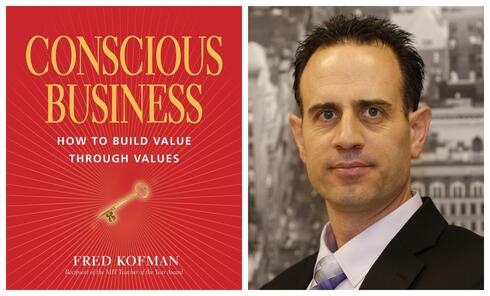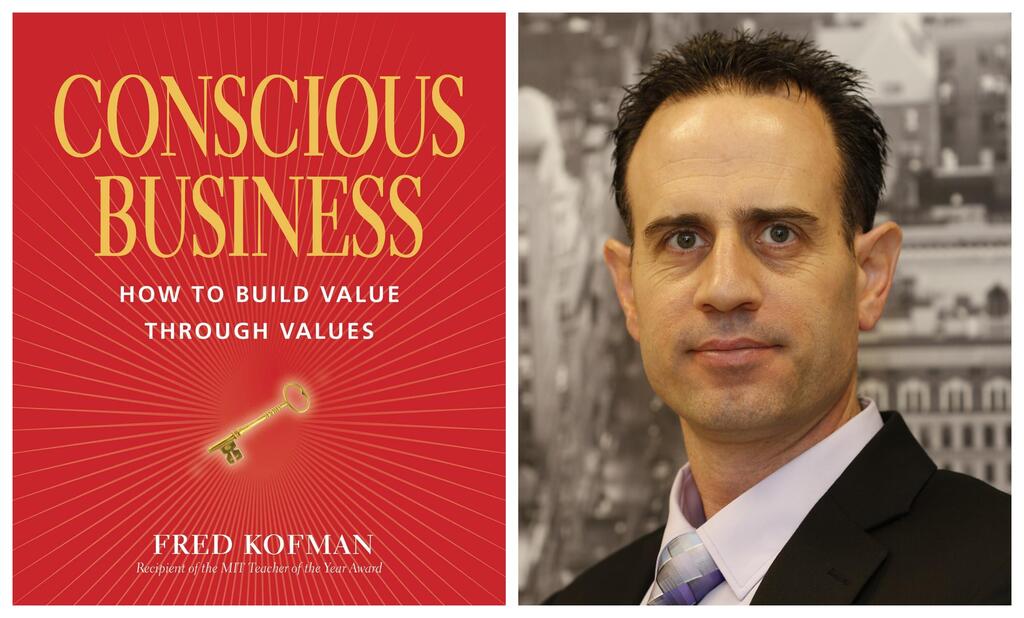
BiblioTech
CTech's Book Review: Creating an organization based on core values
Tamir Avihud, Co-founder and COO at Link2USA, shares insights after reading “Conscious Business” by Fred Kofman
Tamir Avihud is the Co-founder and COO at Link2USA, a search firm providing a solution for international startups and companies seeking to expand their presence abroad. He has joined CTech to share a review of “Conscious Business” by Fred Kofman
Title: “Conscious Business”
Author: Fred Kofman
Format: Book
Where: Home
Summary:
What is the difference between good companies and great companies?
The most successful companies are those that can strive for more than financial success because they are motivated by higher values.
Based on Ferd Kofman’s book Conscious Business, to make the difference between the good and the great, you need to know how to build value through values
Conscious Business shows you how to create an organization based on core values. Consciousness is the main source of organizational greatness.
Many successful businesses are powered by conscious employees. They take responsibility for their own actions and know how to operate without compromising their core values.
Important Themes:
Conscious Business presents breakthrough techniques to help leaders achieve conscious attitudes that include:
- Unconditional responsibility - how to become the main character of your life: The victim vs. the player mentality and how to change it. In general, there are two types of people in the workplace: the players and the victims. Players are the ones who take action and take responsibility for their actions.
- Essential integrity - how to succeed beyond success: To protect your own consistency, focus on the process more than the results. Your actions will not only be tools to achieve a certain goal – they will also represent your value. And that's how you build consistency, by continually acting on your values
- Ontological Humility - everyone sees the world differently: "Acknowledgment that you do not have a special claim on reality or truth, that others have equally valid perspectives deserving respect and consideration." We should recognize, respect, and learn from these differences. ontological humility,” a state when you are able to perceive the point of view of others.
- Authentic communication - how to speak your truth, and listen to others' truths. "Most difficult conversations involve disagreements about what is going on, what has led things to be the way they are, why it happened, what should happen next, and who should do what to make it happen ... in difficult conversations, people feel that their sense of identity and esteem is at risk ... When criticism meets defensiveness, it turns into contempt."
- Be frank about what you think - establish common ground with your audience. We are sure of how other people's behaviors impacted us but we cannot be sure of their intentions. We are also sure of our own intentions but not sure of how our actions impact others. Take time to acknowledge and validate the impact of our actions on others before we clarify our intentions.
- Constructive negotiation - resolve conflicts rationally (without denying or avoiding them) with constructive negotiation. Constructive negotiation is a way of creating space for new possibilities, by encouraging people to be less aggressive and more cooperative. That is why an atmosphere of mutual learning is so important – without it, constructive negotiation seems impossible. Kofman, in his book, provides a step-by-step process to handle conflict.
- Impeccable coordination - how to coordinate actions with accountability. When coordinating actions, and gaining commitments, make your request like this: "In order to accomplish X (the satisfaction of a need), I ask you to do Y (a specific action) by Z (a specific time). Can you commit to that?" Praise your people when they demonstrate impeccable coordination and commitment. Praise respectfully, directly, and specifically in the second person and focus on how the person's action affected you as opposed to labeling who that person is.
- Emotional Mastery - when you're emotionally charged, it's hard to do what you know is right.
- Be aware and calm down - to control strong negative emotions.
- Accept your emotions without judgment - you can't prevent an emotion but you can prevent impulsiveness. Regulate your impulses and recognize that your emotions come from your interpretation of some stimulus. Share the story behind your emotion.
When you see others being hijacked by their emotions, accept the emotions without judgment and become curious. Stay relaxed and centered and show empathy. Recognize that the person is speaking their truth, which is valid for them.
What I’ve Learned:
I’m a leader at Link2USA, and I asked myself: what culture do I want to build? Influencing culture allows you to get the greatest towards sustainable change. Culture develops from the behaviors of the leaders and what is rewarded and punished.
Ask yourself: “What culture do we need in order to execute our strategy and fulfill our mission?”
What are our values? We, as leaders looking to engage employees, we focus on the business results and we know happy employees will deliver great results.
From this book, I learned what kind of work environment supports fulfillment
An environment in which people feel respected, listened to, valued, supported, and entrusted with meaningful and challenging work, one that allows them to operate in alignment with their values as they contribute to the mission of the organization with autonomy, power, and integrity.
Happy people are much more productive and able to cooperate with others. They are resilient when suffering setbacks and enthusiastic when facing opportunities. They trust themselves to respond appropriately to life’s circumstances, to connect with others, and to deliver exceptional results. If people are not happy in their jobs, they will not remain engaged, they will not last productive employees.
To be engaged, people demand to feel accepted, respected, supported, acknowledged, and challenged. Monetary compensation alone cannot accomplish this.
Who Should Read This Book:
Any manager, any leader, who wants to make a change.
As Kofman says in his book: "As a leader, you are not just responsible for doing it, but for holding others accountable for doing it as well. I see that you behave with integrity, but I do not see you holding people accountable when they behave without integrity. When they betray the company’s values and you don’t do anything, you become their accomplice. A leader who does not confront broken commitments encourages polite complacency. He fosters a culture of niceness where nothing gets done and everything is excused."














